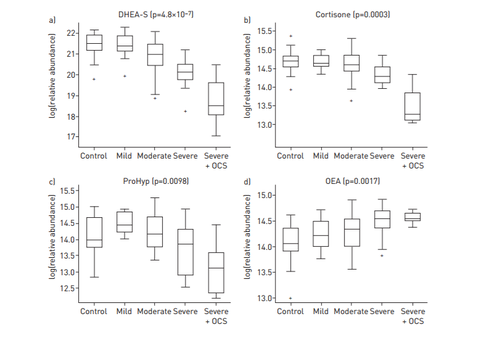A multi-national group of researchers has identified metabolic profiles of asthma that differentiate between mild, moderate and severe, and revealed that some circulating metabolites are influenced by steroid treatment.
The cross-sectional study, published today (30 March, 2017) in the European Respiratory Journal, sought to identify whether there is a metabolic signature of asthma that would enable the characterisation of asthma metabotype, and if this signature is related to disease severity.
The group applied liquid chromatography–high-resolution mass spectrometry (LC-HRMS) to characterise the serum metabolic profiles of 22 healthy controls and of 12 mild, 20 moderate and 22 severe asthma patients. Three mass spectrometry-based targeted methods were performed to confirm the metabolomics results, including the measurement of eicosanoids, sphingolipids and free fatty acids.
Researchers observed that patients with mild asthma who had not taken steroids displayed a metabolic profile that was different from healthy controls and patients with moderate or severe asthma. Multivariate modelling revealed eight metabolites that were increased and six that were decreased in patients with mild asthma when compared to healthy individuals; contrastingly, 10 metabolites were increased, and 12 were decreased, in patients with moderate or severe asthma.
The authors believe the findings show that several circulating metabolites in asthma differ from those in healthy individuals and are related to disease severity, while others are influenced by steroid treatment. They conclude that mild and moderate asthma are different phenotypes based on their distinct metabolic profiles, but there is a distinct need to further analyse these metabolic patterns in a larger cohort using a more comprehensive metabolite database.
An accompanying editorial written by Professor Peter J. Sterk helps to contextualise this new research on asthma mechanisms, and suggests that more research in this kind of detail is needed to enable scientists to better understand the complexities of human health.





